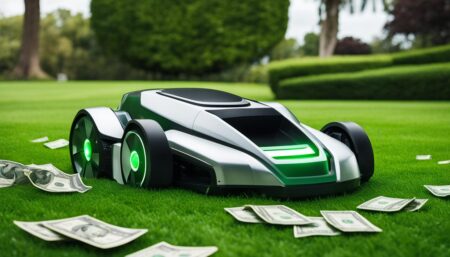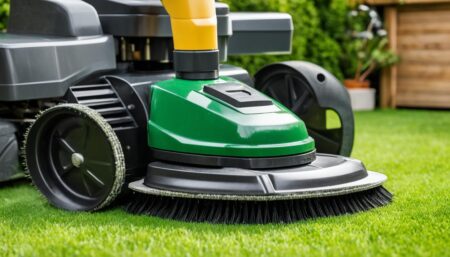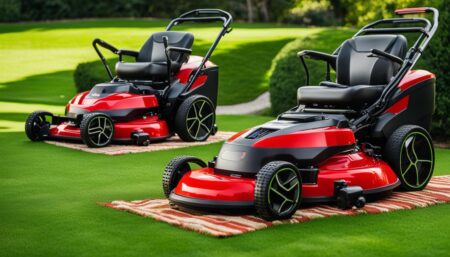Robot mowers are revolutionizing lawn care with their eco-friendly operation. These advanced machines are paving the way for sustainable and energy-efficient lawn maintenance, reducing environmental impact while still delivering a beautifully manicured lawn. Here, we explore the environmental benefits of robot mowers and why they are becoming the go-to choice for eco-conscious homeowners.
Key Takeaways:
- Robot mowers offer eco-friendly and sustainable lawn care
- They reduce emissions and improve air quality
- Robot mowers eliminate the need for chemical fertilizers and pesticides
- They operate on rechargeable batteries, reducing reliance on fossil fuels
- By embracing robot mowers, homeowners can have well-maintained lawns while minimizing their environmental impact
The Environmental Impact of Traditional Lawn Care
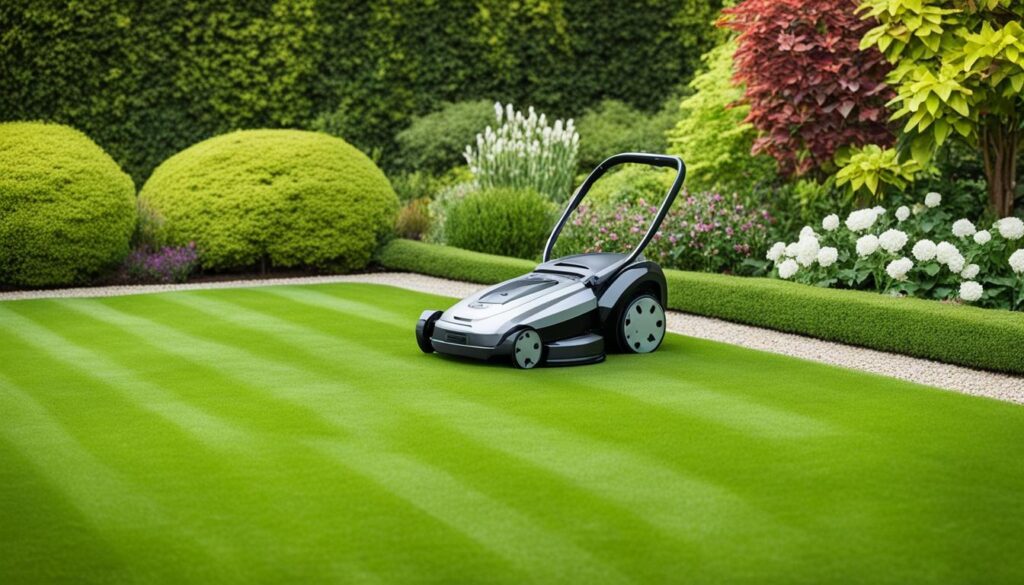
Traditional lawn care practices, particularly the use of gas-powered lawn mowers, have significant environmental consequences. These mowers emit greenhouse gases, such as carbon dioxide (CO2), and contribute to air pollution. The exhaust fumes contain nitrogen oxides (NOx) and particulate matter, which can harm human health and worsen air quality. By understanding the negative environmental impact of traditional lawn care, homeowners can see the relevance of eco-friendly alternatives like robot mowers.
Gas-powered lawn mowers are notorious for their emissions of carbon dioxide, a greenhouse gas that contributes to global warming. According to the Environmental Protection Agency (EPA), a new gas-powered mower can produce as much pollution in one hour as 11 new cars driving for the same period.
The emissions from gas-powered mowers not only contribute to climate change but also impact local air quality. The combustion of gasoline generates nitrogen oxides, which contribute to the formation of smog and pollutants harmful to human health. Additionally, the release of fine particulate matter and volatile organic compounds from traditional lawn mowers can cause respiratory problems and exacerbate allergies.
When homeowners switch to eco-friendly alternatives like robot mowers, they can significantly reduce their carbon footprint and mitigate the negative environmental effects associated with traditional lawn care.
“Gas-powered mowers can produce as much pollution in one hour as 11 new cars driving for the same period.”
Robot mowers operate on electricity, eliminating the need for fossil fuels and thus reducing carbon emissions. They are powered by rechargeable batteries, which can be charged using renewable energy sources like solar power. This not only reduces greenhouse gas emissions but also decreases dependence on non-renewable energy sources.
Additionally, robot mowers contribute to improved air quality. By eliminating the combustion of gasoline, they prevent the release of nitrogen oxides and other pollutants into the atmosphere. Cleaner air leads to better respiratory health for individuals and a healthier environment for all.
Moreover, robot mowers offer the advantage of quiet operation. Traditional mowers can be loud, causing noise pollution in residential areas. In contrast, robot mowers operate at a low volume, minimizing noise disturbances and creating a more peaceful environment.
Overall, by embracing eco-friendly alternatives like robot mowers, homeowners can reduce their carbon footprint, promote cleaner air, and contribute to a more sustainable future. In the next section, we will explore the specific environmental benefits that robot mowers offer in detail.
| Environmental Impact | Traditional Lawn Care | Eco-Friendly Robot Mowers |
|---|---|---|
| Carbon Footprint | High emissions of greenhouse gases, contributing to climate change | Reduced carbon emissions, running on electricity instead of fossil fuels |
| Air Pollution | Emissions of nitrogen oxides and particulate matter | Eliminates gasoline combustion, resulting in cleaner air |
| Noise Pollution | Loud operation, causing noise disturbances | Quiet operation, minimizing noise pollution |
The Environmental Benefits of Robot Mowers
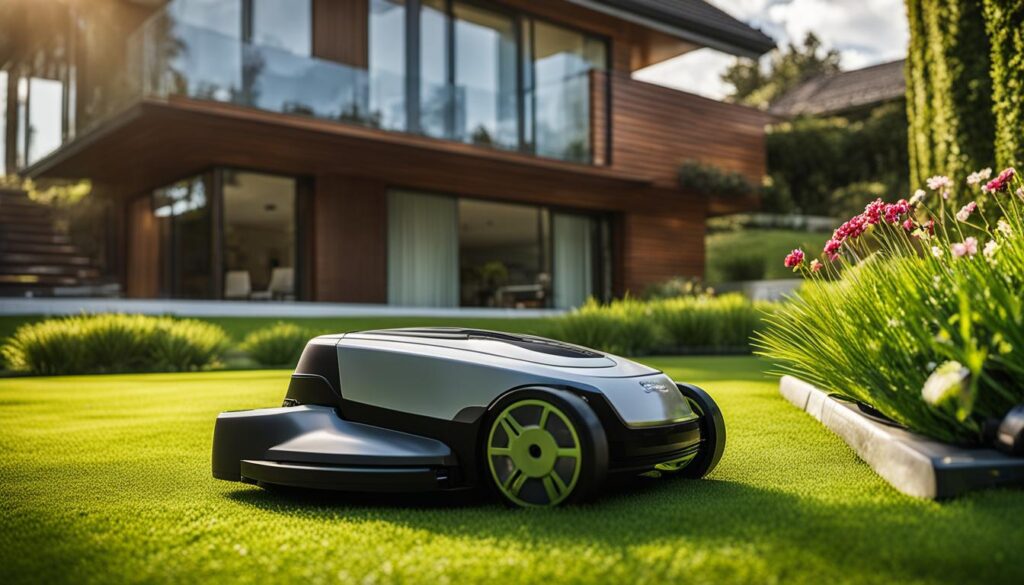
Robot mowers offer a range of environmental benefits, making them an ideal choice for sustainable lawn care with eco-conscious maintenance and eco-friendly landscaping. These innovative machines contribute to a cleaner and greener environment in several ways.
Reduced Emissions for Cleaner Air
One of the significant advantages of robot mowers is their use of electricity instead of fossil fuels. By eliminating the need for gas-powered engines, these mowers significantly reduce emissions and promote cleaner air. With lower carbon dioxide, nitrogen oxide, and volatile organic compound releases, residents can enjoy improved air quality and a smaller carbon footprint.
Energy Efficiency and Resource Conservation
Robot mowers operate with remarkable energy efficiency, optimizing power usage and conserving resources in the process. Their advanced technology ensures optimal mowing strategies and targeted cuts, eliminating the need for excess energy consumption. As a result, homeowners can achieve healthy and well-maintained lawns while reducing their ecological impact.
Quiet Operation and Noise Pollution Reduction
Unlike traditional mowers, robot mowers operate quietly, minimizing noise pollution. Their advanced motors produce significantly lower noise levels, allowing residents to enjoy peaceful outdoor spaces. This feature is particularly beneficial for urban areas and neighborhoods where noise regulations and quality of life are a priority.
Promoting Healthier Lawns without Chemicals
Robot mowers offer customization options that allow for targeted and efficient mowing. By consistently and evenly trimming the grass, these machines promote healthier lawns without the need for chemical fertilizers and pesticides. The result is a lush, vibrant lawn that is environmentally friendly and safe for families and pets.
With sustainable lawn care and eco-conscious maintenance at the forefront, robot mowers provide a compelling solution for homeowners seeking greener alternatives. By embracing the environmental benefits of these innovative machines, individuals can contribute to a healthier planet while enjoying a beautifully manicured lawn.
The Advantages of Robot Mowers
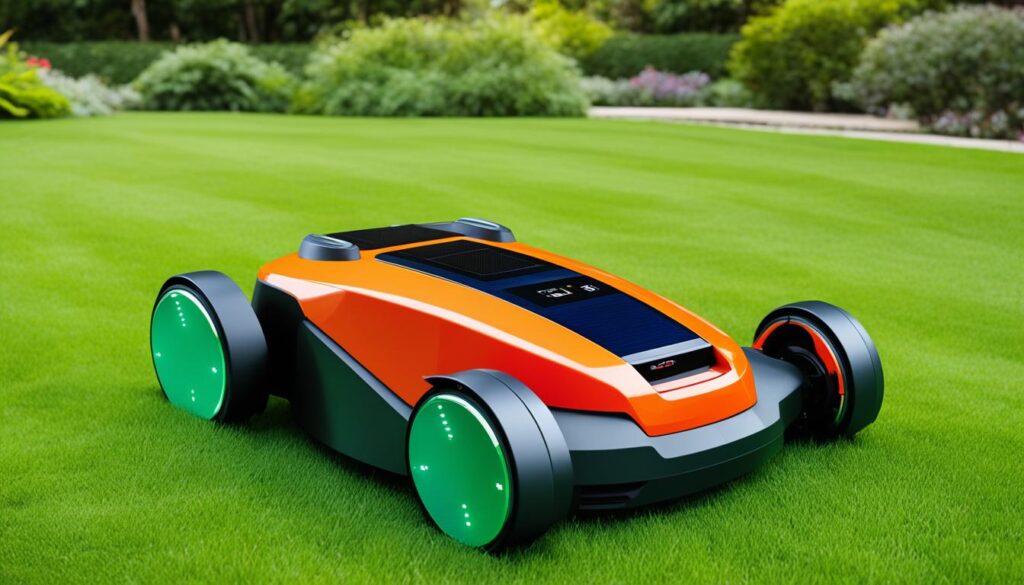
Robot mowers offer numerous advantages over traditional mowers. Embracing these energy-efficient robot mowers provides homeowners with green alternatives to traditional lawn mowers. Let’s explore the key benefits of incorporating robot mowers into your lawn care routine.
Precise and Efficient Operation
Robot mowers operate autonomously, using advanced technology and algorithms to ensure precise and even cutting. With their efficient operation, these mowers can save you time and effort in maintaining your lawn, allowing you to enjoy a well-manicured yard effortlessly.
Designed for Versatility
Robot mowers are designed to handle various terrains and can navigate obstacles with ease. Whether you have a flat lawn, slopes, or uneven areas, these mowers can adapt to your landscape. They can effortlessly traverse challenging terrain, ensuring consistent and thorough mowing throughout your entire yard.
Elimination of Fossil Fuels
One of the most significant advantages of robot mowers is their use of rechargeable batteries, eliminating the need for fossil fuels. By running on clean energy, these mowers contribute to a greener future by reducing carbon emissions and minimizing their environmental impact.
Optimized Resource Conservation
Some robot mower models are equipped with rain sensors, allowing them to adjust their mowing schedule based on weather conditions. This feature optimizes energy and water resources by preventing unnecessary mowing when it’s raining. By conserving resources, robot mowers promote sustainable lawn care practices.
Robot mowers offer eco-friendly lawn care without sacrificing the quality of your lawn. These energy-efficient machines provide green alternatives to traditional lawn mowers, helping you reduce your environmental footprint while enjoying the benefits of a well-maintained yard.
By adopting robot mowers, homeowners can take advantage of their advanced features and contribute to a more sustainable future. Not only do these mowers provide convenience and efficiency, but they also minimize the use of fossil fuels and conserve resources. Say goodbye to the noise and emissions of traditional mowers and embrace the eco-friendly solution that robot mowers offer.
Choosing the Right Robot Lawn Mower
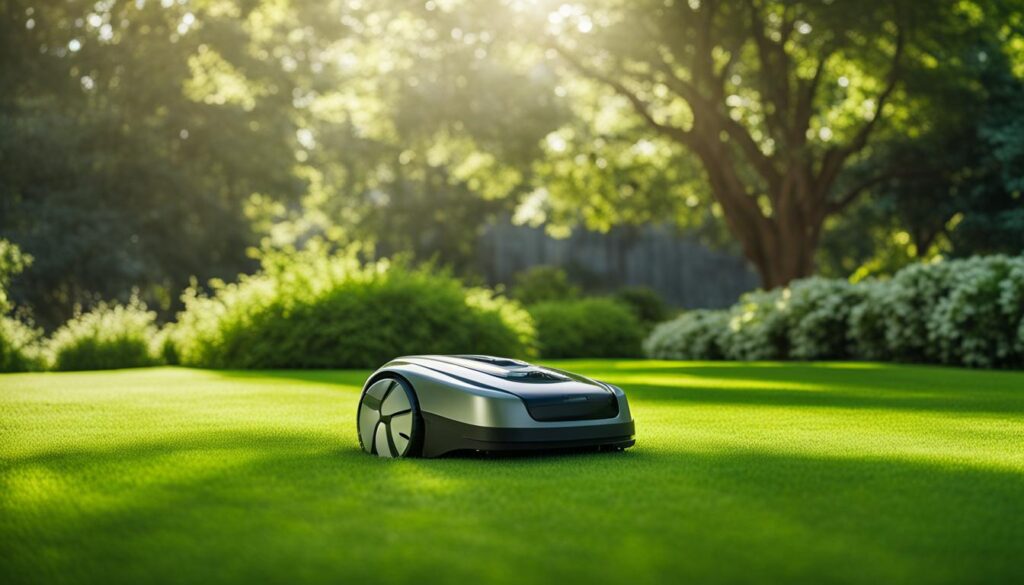
Investing in a robotic lawn mower is a smart decision for homeowners who prioritize environmental sustainability and efficient lawn care. However, with the increasing variety of options available in the market, it’s essential to choose the right robot lawn mower that aligns with your specific needs and preferences.
Finding the Perfect Fit
When selecting a robot lawn mower, consider the following factors:
- Lawn size and terrain: Assess the size and complexity of your lawn, including slopes and obstacles. Certain models are better suited for larger or smaller yards, while others are equipped to handle uneven terrain.
- Battery life: Check the battery life of the robot mower and ensure it can adequately cover your lawn without needing frequent recharging.
- Cutting width and height adjustments: Look for a mower that offers customizable cutting width and height adjustments to achieve your desired lawn length and appearance.
- Navigation system capabilities: Research the navigation system used by the robot mower. Advanced navigation systems provide efficient coverage and obstacle avoidance features.
- Rain sensors: Opt for a model that includes rain sensors to avoid mowing during wet conditions, conserving energy and promoting healthier lawns.
By carefully considering these factors, you’ll be able to narrow down your options and choose the perfect robot lawn mower for your environmental sustainability goals.
Contributing to a Greener Future
Investing in a robotic lawn mower not only ensures a well-maintained lawn but also contributes to a greener future. These advanced machines minimize the use of fossil fuels and reduce emissions, promoting environmental sustainability. By embracing this eco-conscious lawn maintenance solution, homeowners play an active role in reducing their carbon footprint and supporting the global effort towards a more sustainable planet.
The Rise of Robot Lawn Mowers in the United States
In the United States, there is a growing demand for sustainable and efficient lawn maintenance. This is particularly crucial considering the vast amount of land dedicated to lawns, playing fields, and golf courses across the country. The traditional methods of lawn care, which involve gas-powered mowers, contribute significantly to carbon emissions and environmental degradation.
Fortunately, the rise of robot lawn mowers offers a promising solution to reduce carbon footprints and promote sustainable practices in lawn care. These innovative machines have gained popularity among homeowners who are increasingly aware of the need to minimize their impact on the environment.
Robot mowers provide several key benefits that align with sustainable lawn care principles. By operating on electricity instead of fossil fuels, they eliminate harmful emissions and help improve air quality. Their energy-efficient operation also conserves resources, contributing to a greener future. Moreover, the precise and targeted cutting capabilities of robot mowers eliminate the need for chemical fertilizers and pesticides, further reducing potential environmental harm.
The increasing adoption of robot mowers signifies a shift towards eco-conscious lawn maintenance practices and a commitment to reducing carbon footprints. As more homeowners recognize the many advantages of sustainable lawn care, the demand for robot lawn mowers continues to rise.
The Future of Lawn Care: Automation and Sustainability
Automation and sustainability are driving the future of lawn care. As technology continues to advance, eco-friendly robot mowers are becoming more sophisticated, efficient, and affordable. Homeowners are increasingly recognizing the importance of sustainable practices and actively seeking green alternatives to traditional lawn mowers. The adoption of robot mowers reflects a growing awareness of the environmental impact of lawn care and the desire to create a greener future.
Robot mowers offer a viable solution for sustainable lawn care with their eco-friendly operation. By reducing emissions and promoting energy efficiency, robot mowers play a crucial role in minimizing carbon footprints and preserving the environment. These innovative machines are designed to prioritize eco-conscious lawn maintenance, promoting a healthier and more sustainable approach to landscaping.
With their precision cutting, customization options, and autonomous operation, robot mowers offer hands-free lawn maintenance without the need for chemical fertilizers or pesticides. By keeping lawns well-maintained and healthy, these intelligent devices contribute to a natural and sustainable landscape.
As homeowners increasingly prioritize eco-friendly practices, the demand for sustainable lawn care with robot mowers is set to rise. The advantages of these green alternatives, such as reduced emissions, improved air quality, and energy efficiency, make them an appealing choice for environmentally conscious individuals.
The Advantages of Eco-Friendly Robot Mowers
Let’s take a closer look at the advantages of eco-friendly robot mowers:
- Reduced emissions: Robot mowers operate on electricity instead of fossil fuels, significantly reducing their carbon footprint and air pollution.
- Improved air quality: By minimizing the release of pollutants like carbon dioxide, nitrogen oxides, and volatile organic compounds, robot mowers contribute to cleaner and healthier air.
- Energy efficiency: These machines are designed to be highly efficient in their operation, saving energy and conserving resources.
- Noise reduction: Robot mowers operate quietly compared to traditional lawn mowers, reducing noise pollution in residential areas.
- Customized mowing: With advanced navigation and mapping capabilities, robot mowers can handle various terrains and obstacles while providing precise and targeted mowing.
Comparative Features of Eco-Friendly Robot Mowers
| Feature | Eco-Friendly Robot Mower A | Eco-Friendly Robot Mower B | Eco-Friendly Robot Mower C |
|---|---|---|---|
| Battery Life | Up to 2 hours | Up to 3 hours | Up to 4 hours |
| Cutting Width | 10 inches | 12 inches | 14 inches |
| Height Adjustments | 3 settings | 4 settings | 5 settings |
| Navigation System | GPS-based | LiDAR-based | Camera-based |
| Rain Sensor | Yes | Yes | No |
In conclusion, with their eco-friendly operation and numerous advantages, eco-friendly robot mowers are paving the way for a more sustainable approach to lawn care. The future of lawn care lies in automation and sustainability, and the adoption of green alternatives to traditional lawn mowers will continue to play a vital role in creating a greener environment for generations to come.
Overcoming Challenges and Barriers
While robot mowers offer numerous benefits, there are several challenges and barriers that need to be addressed for their widespread adoption. It is important to consider these factors when considering the reduction of carbon footprint with robot mowers and exploring green alternatives to traditional lawn mowers.
One of the challenges faced is that some properties may not be suitable for autonomous mowers. Factors such as uneven terrain, complex landscapes, or narrow passages can pose obstacles to the effective operation of robot mowers. However, ongoing advancements in technology are improving the capabilities of these mowers, allowing them to navigate various terrains and overcome obstacles with ease.
Another barrier to consider is the initial investment cost. Robot mowers tend to have a higher upfront cost compared to traditional mowers. This can deter some homeowners from adopting this green alternative. However, it is essential to consider the long-term benefits, such as reduced fuel costs, lower maintenance expenses, and the positive environmental impact. As the demand for these mowers increases, it is expected that prices will become more competitive, making them a more affordable option for sustainable lawn care.
Wireless models, although convenient, may still face technological limitations, especially in yards with trees or extensive landscaping. Connectivity issues or signal interference can affect the performance and effectiveness of these mowers. However, manufacturers are constantly improving the software and hardware of these devices to overcome these challenges. Homeowners can also explore models with stronger wireless capabilities or opt for boundary wire installation to enhance the mower’s performance.
“While there are challenges and barriers in adopting robot mowers, ongoing advancements in technology are addressing these issues, making robot mowers a more viable green alternative to traditional lawn mowers.”
By acknowledging and addressing these challenges, homeowners can overcome barriers on the journey to reducing their carbon footprint with robot mowers. As technology continues to evolve, the advantages of robot mowers in terms of energy efficiency, convenience, and sustainability will become more prominent, making them an increasingly attractive option for eco-conscious individuals.
Related challenges and solutions:
| Challenge | Solution |
|---|---|
| Uneven terrain | Choose a robot mower model with advanced navigation and terrain adaptation capabilities. |
| Complex landscapes | Opt for models with specialized features for navigating around flower beds, trees, and other obstacles. |
| Narrow passages | Ensure that the robot mower selected can maneuver through narrow paths without any issues. |
| High upfront cost | Weigh the long-term savings and environmental benefits against the initial investment. |
| Connectivity issues | Opt for models with stronger wireless capabilities or consider boundary wire installation for improved connectivity. |
Conclusion
The increasing popularity of robot mowers reflects a growing shift in lawn care practices towards sustainability and a reduction in ecological footprints. These eco-friendly machines offer a range of environmental benefits, including decreased emissions, improved air quality, energy efficiency, and resource conservation. As homeowners become more conscious of their environmental impact, the adoption of robot mowers will continue to rise, contributing to a greener and more sustainable future for lawn care.
By embracing robot mowers, homeowners can enjoy well-maintained lawns while minimizing their ecological footprint. These innovative machines operate on electricity, reducing reliance on fossil fuels and cutting down on harmful emissions. With their efficient and targeted mowing capabilities, robot mowers eliminate the need for chemical fertilizers and pesticides, promoting natural and eco-conscious lawn maintenance.
Furthermore, robot mowers contribute to improved air quality by mitigating the release of pollutants, such as carbon dioxide and nitrogen oxides. Their quiet operation reduces noise pollution, creating a peaceful outdoor environment. In addition, their energy-efficient design and advanced technology help conserve resources, making them a sustainable alternative to traditional lawn mowers.
As the demand for green alternatives to traditional lawn care practices continues to grow, robot mowers are leading the way in providing an eco-friendly solution. With ongoing advancements in technology and greater accessibility, these machines are becoming more sophisticated, efficient, and affordable. By adopting robot mowers, homeowners can prioritize environmental sustainability and contribute to the creation of a greener future.
FAQ
How do robot mowers reduce environmental impact?
Robot mowers reduce environmental impact by using electricity instead of fossil fuels, resulting in cleaner air and a smaller carbon footprint. They also minimize the release of pollutants like carbon dioxide, nitrogen oxides, and volatile organic compounds, contributing to improved air quality.
What are the advantages of robot mowers compared to traditional mowers?
Robot mowers operate autonomously and efficiently, with advanced technology ensuring precise and even cutting. They run on rechargeable batteries, reducing dependence on fossil fuels. Additionally, their quiet operation reduces noise pollution, and their customization options allow for targeted and efficient mowing, promoting healthier lawns without the need for chemical fertilizers and pesticides.
How can homeowners choose the right robot lawn mower for their needs?
Homeowners should consider factors such as lawn size and terrain, battery life, cutting width and height adjustments, navigation system capabilities, and the presence of rain sensors. Assessing specific lawn needs will help select the most suitable model for environmental sustainability and efficient lawn care.
What is the future of lawn care with robot mowers?
Robot mowers are shaping the future of lawn care by offering sustainable and efficient alternatives to traditional lawn mowers. As technology advances, these mowers are becoming more sophisticated, efficient, and affordable. Homeowners are increasingly prioritizing eco-friendly practices and seeking green alternatives, leading to the rise in adoption of robot mowers.
What challenges and barriers exist for widespread adoption of robot mowers?
Some properties may not be suitable for autonomous mowers, and the initial investment cost may deter homeowners. Additionally, wireless models may face technological limitations in yards with trees or landscaping. However, ongoing advancements in software and hardware are addressing these challenges, making robot mowers a more viable option for sustainable lawn care.
What is the impact of traditional lawn care practices on the environment?
Traditional lawn care practices, particularly the use of gas-powered lawn mowers, have significant environmental consequences. These mowers emit greenhouse gases, such as carbon dioxide, and contribute to air pollution. The exhaust fumes contain nitrogen oxides and particulate matter, which can harm human health and worsen air quality.
How can homeowners reduce their carbon footprint with robot mowers?
By opting for robot mowers, homeowners can reduce their carbon footprint as these mowers use electricity instead of fossil fuels. This helps to minimize emissions and promote sustainable lawn care practices, contributing to a greener future.
How do robot mowers promote eco-conscious lawn maintenance?
Robot mowers promote eco-conscious lawn maintenance by minimizing the need for chemical fertilizers and pesticides. Their targeted and efficient mowing patterns help maintain healthier lawns naturally, reducing environmental pollution and protecting local ecosystems.
What are the environmental benefits of landscaping with robot mowers?
Landscaping with robot mowers offers several environmental benefits, including reduced emissions, improved air quality, energy efficiency, and the conservation of resources. These eco-friendly machines contribute to a greener and more sustainable approach to lawn care.




